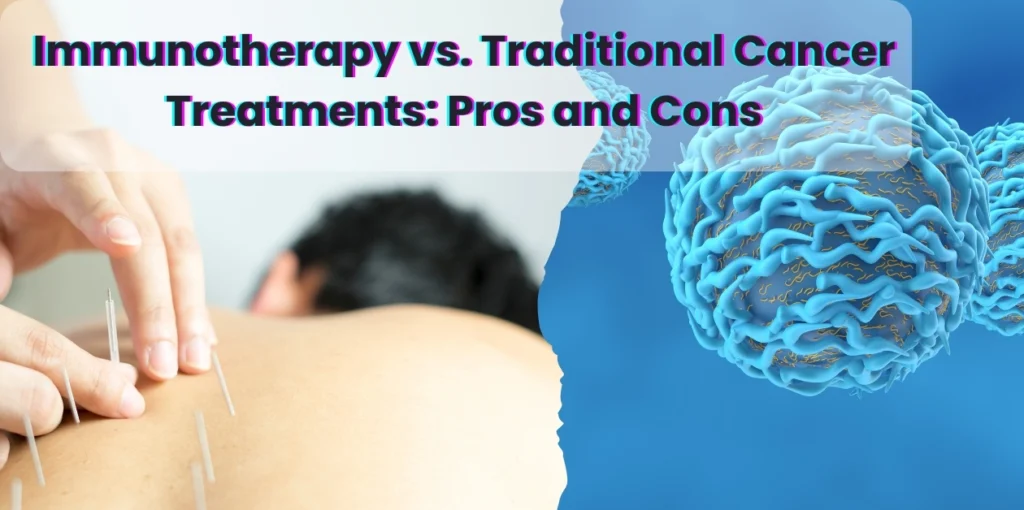Immunotherapy vs Traditional Cancer Treatments: Pros and Cons

Cancer treatment has evolved significantly, with immunotherapy emerging as a revolutionary approach alongside traditional cancer treatments like chemotherapy and radiation therapy. Understanding the pros and cons of immunotherapy vs. traditional cancer treatments can help patients make informed choices. Let’s explore how these treatments compare in terms of effectiveness, side effects, and overall outcomes.
Traditional Cancer Treatments
1. Chemotherapy
Pros:
- Broad Effectiveness: Chemotherapy is a tried-and-true method effective against various cancers due to its ability to target rapidly dividing cells.
- Established Protocols: The long history of chemotherapy use has led to well-defined treatment guidelines and predictable outcomes.
- Palliative Benefits: Often used to shrink tumors and alleviate symptoms, improving patient quality of life.
Cons:
- Side Effects: Patients commonly experience nausea, hair loss, and fatigue, as well as a heightened risk of infections due to immune suppression.
- Non-Specific Targeting: Chemotherapy affects all rapidly dividing cells, including healthy ones, leading to collateral damage.
- Resistance Issues: Over time, some cancers may develop resistance to chemotherapy, reducing its effectiveness.
2. Radiation Therapy
Pros:
- Localized Treatment: Radiation therapy targets specific tumor areas, minimizing damage to surrounding healthy tissues.
- Effective for Certain Cancers: Particularly useful for localized tumors or cancers in accessible areas.
- Shorter Treatment Duration: Typically involves fewer sessions compared to some other treatments.
Cons:
- Skin and Tissue Damage: Can cause burns, fatigue, and damage to nearby organs.
- Limited Application: Less effective for cancers that have spread beyond the targeted area or are in hard-to-reach locations.
- Long-term Risks: Potential for secondary cancers or long-term tissue damage.
Immunotherapy
1. Checkpoint Inhibitors
Pros:
- Targeted Approach: Checkpoint inhibitors work by blocking proteins that inhibit the immune system’s ability to attack cancer cells, offering a more targeted treatment strategy.
- Long-lasting Responses: Some patients experience durable remissions, continuing to benefit even after the treatment ends.
- Potential for Fewer Side Effects: Generally targets cancer cells more specifically, potentially leading to fewer side effects compared to traditional treatments.
Cons:
- Varied Effectiveness: Not all patients or cancers respond to checkpoint inhibitors, leading to variable results.
- Immune-Related Side Effects: Risks include immune system-related side effects like inflammation and autoimmune-like symptoms.
- High Cost: Often comes with a significant price tag, which may be a barrier for some patients.
2. CAR-T Cell Therapy
Pros:
- Personalized Treatment: CAR-T cell therapy involves modifying a patient’s own T cells to specifically target cancer cells, providing a highly individualized treatment option.
- High Effectiveness for Certain Cancers: Especially successful in treating certain blood cancers such as leukemias and lymphomas.
- Durable Remissions: Potential for long-term remission in patients with otherwise difficult-to-treat cancers.
Cons:
- Complex and Intensive: Requires a specialized facility and involves a complex process including cell harvesting and modification.
- Serious Side Effects: Risks include severe complications such as cytokine release syndrome and neurotoxicity.
- Limited Scope: Currently approved primarily for specific blood cancers, with ongoing research into applications for solid tumors.
Choosing the Right Treatment
When comparing immunotherapy vs. traditional cancer treatments, it’s essential to consider factors like cancer type, stage, and patient health. Traditional treatments like chemotherapy and radiation therapy have established effectiveness and protocols but come with notable side effects. Immunotherapy offers a novel approach by leveraging the body’s immune system but presents its own set of challenges and costs.
The decision on the best treatment option should be made in consultation with a healthcare professional who can provide personalized recommendations based on the latest research and patient-specific factors. As medical research progresses, the options for cancer treatment will continue to expand, offering new hope and potential for those affected by cancer.

Dr. A. Venugopal
Clinical Director & HOD Medical Oncology Senior Consultant Medical Oncologist & Hemato-Oncologist
About Author
Dr. A. Venugopal
MD (General Medicine), DM (Medical Oncology), MRCP – SCE Medical Oncology (UK), ECMO (Switzerland).
Dr A. Venugopal is One of the best medical oncologist and Hemato Oncologist in hyderabad, currently serving as the Head of the Department and Senior Medical Oncologist, Hemato Oncologist at Pi Health Cancer Hospital in Gachibowli, Hyderabad. He brings over 15 years of extensive experience in the field of Oncology.
